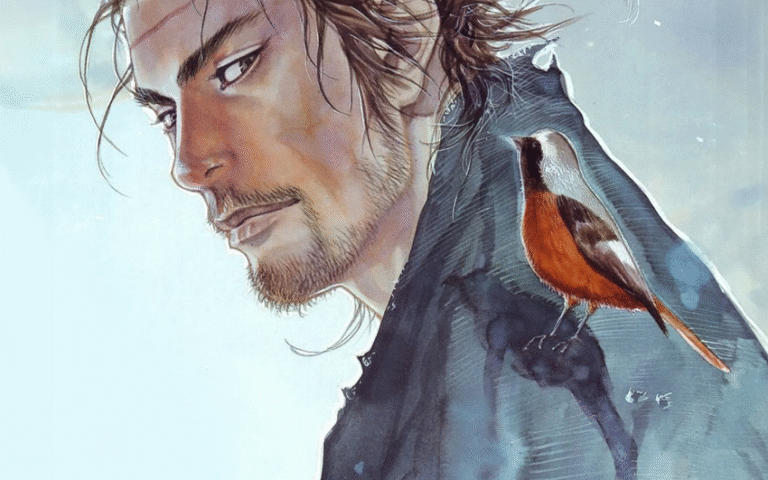Matachi Honiden: A Tragic Portrait of Cowardice and Insecurity in Vagabond
Matachi Honiden is a minor yet symbolically significant character in Vagabond, Takehiko Inoue’s masterful retelling of the life of Miyamoto Musashi. As the son of the Honiden family from Miyamoto village and childhood friend of Takezo (Musashi), Matachi plays an early role that exposes the psychological and emotional undercurrents of the story.
Though he isn’t a warrior of legend or a martial arts genius, Matachi embodies a different kind of conflict: the internal battle of fear, envy, and insecurity.

Character Profile: Matachi Honiden
| Attribute | Details |
|---|---|
| Full Name | Matachi Honiden |
| First Appearance | Vagabond Manga, Early Chapters |
| Affiliation | Honiden Clan (Miyamoto Village) |
| Personality | Jealous, cowardly, bitter |
| Role | Childhood friend & contrast to Takezo |
| Fate | Humiliated; left behind in the story’s arc |
Matachi’s Background and Role in the Story

Matachi is introduced alongside his friend Den and the central protagonist Takezo (later Miyamoto Musashi). The three join the Battle of Sekigahara with dreams of glory, but their motivations are drastically different:
- Takezo fights out of raw instinct and survival.
- Den is passive, merely following along.
- Matachi joins out of a desire to become someone great—but not through strength or willpower, rather through association and shortcuts.
During the chaos of war, Matachi’s cowardice becomes apparent. He panics, betrays his comrades, and eventually returns home broken—both physically and mentally.
Matachi Honiden vs. Takezo (Musashi): A Symbolic Contrast
Matachi serves as a foil to Takezo in nearly every aspect:
| Aspect | Matachi Honiden | Takezo / Musashi |
|---|---|---|
| Motivation | Envy, validation | Self-discovery, strength |
| Response to Conflict | Fear and retreat | Courage and perseverance |
| Growth Path | Stagnant and bitter | Continuous self-evolution |
| View of Life | Superficial glory | Deeper truth through battle |
Where Takezo transforms into the legendary Musashi through hardship and introspection, Matachi remains emotionally stunted—always looking outward to blame rather than inward to grow.
Psychological Depth: Why Matachi Resonates
Despite being a “side character,” Matachi Honiden feels disturbingly real. His behavior mirrors many real-life traits:
- Jealousy of successful peers
- Fear of failure masked as arrogance
- Inability to take responsibility
This realism gives him weight. Matachi doesn’t die a noble death or learn a profound lesson—he simply disappears into irrelevance. And that, in itself, is tragic.
Matachi and the Theme of Weakness in Vagabond
One of the recurring themes in Vagabond is the exploration of strength and weakness—not just in combat, but in the soul.
Matachi’s arc shows:
- What happens to those who seek greatness without paying the price.
- How weakness festers when one refuses to confront inner demons.
In a story filled with powerful swordsmen and warriors chasing enlightenment, Matachi reminds us of the other path—one of avoidance, excuses, and bitterness.
Matachi Honiden Quotes (Translated and Paraphrased)
“It’s always about Takezo. Why does it always have to be about him?”
– Matachi expressing envy and self-pity.
“I wanted to be a hero too… but no one saw me.”
– Reflecting on his desire for external validation without merit.
These lines reveal his inner turmoil—he wants recognition but isn’t willing to earn it.
Final Fate: What Happened to Matachi?
After returning from the war, Matachi is beaten by his own village. His lies are exposed, his pride shattered, and he becomes an outcast—completely eclipsed by Takezo’s transformation into Musashi.
He doesn’t return to the story again. Inoue leaves his fate ambiguous, reinforcing the idea that not everyone is destined for greatness—some simply fade away.
Why Matachi Honiden Matters (Even as a Minor Character)
- Narrative Function: He shows us what Takezo could have become if he gave into weakness.
- Emotional Layer: He adds realism to the story—every hero has forgotten friends.
- Moral Warning: His arc warns against ego without effort.
Final Thoughts: Matachi Honiden’s Legacy in Vagabond
While Matachi Honiden may not be remembered as a warrior or philosopher, his story is vital. He is the shadow of every legend—a reminder of the people left behind, the insecurities that can kill potential, and the cost of not facing one’s truth.
In the world of Vagabond, not all battles are fought with swords. Matachi fought his with pride and fear—and lost.







